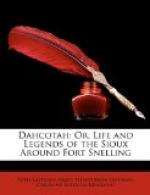He fell, and the waters whirled round as they received his body. The sons of Unktahe shouted fearful cries of rage, but our yells of triumph drowned them.
The water spirits shrank to their home, while we returned to the clouds. The large rain drops fell slowly, and the bow of bright colors rested between the heavens and the earth. The strife was over, and we were conquerors. I know that Unktahe hates me—that he would kill me if he could—but the Thunder bird has greater power than he; the friend of the ‘Man of the West’ [Footnote: Thunder is sometimes called the Man of the West.] is safe from harm.
Harpstenah had ceased her work, and was listening to the boaster. “It was all true,” she said to herself; “the fairy of the water told me that he had offended her race. I will do their bidding. Cloudy Sky may boast of his power, but ere two nights have passed away, he will find he cannot despise the anger of the water spirits, nor the courage of a Dahcotah woman.”
CHAPTER IV.
The approach of night brought with it but little inclination to sleep to the excited girl. Her father slept, tired with the day’s hunt; and her mother dreamed of seeing her daughter the wife of a war chief and a medicine man.
The village was built on the shores of the lake now known as Lake Calhoun. By the light of the moon the teepees were reflected in its waters. It was bright as day; so clear was the lake, that the agates near the shore sparkled in its waters. The cry of the whippoorwill alone disturbed the repose of nature, except when the wild scream of the loon was heard as she gracefully swept the waters.
Seated on the shore, Harpstenah waited to hear the low whistle of her lover. The villagers were almost all asleep, now and then the laugh of some rioters was heard breaking in upon the stillness of night. She had not seen her lover for many days; from the time that her marriage was determined upon, the young warrior had kept aloof from her. She had seized her opportunity to tell him that he must meet her where they had often met, where none should know of their meeting. She told him to come when the moon rose, as her father would be tired, and her mother wished to sleep well before the medicine feast.
Many fears oppressed her heart, for he had not answered her when she spoke to him, and he might not intend to come. Long she waited in vain, and she now arose to return to the teepee, when the low signal met her ear.
She did not wait to hear it a second time, but made her way along the shore: now her steps were printed in the wet sand, now planted on the rocks near the shore; not a sound followed her movements until she stood on the appointed place. The bright moonlight fell upon her features, and her rich dress, as she waited with folded arms for her lover to address her. Her okendokenda of bright colors was slightly open at the neck, and revealed brooches of brass and silver that covered her bosom; a heavy necklace of crimson beads hung around her throat; bracelets of brass clasped her wrists, and her long plaited hair was ornamented at the end of the braids with trinkets of silver.




